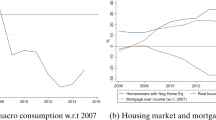Abstract
This paper examines the relationship between measures of the consumer debt burden and various economic indicators. The consumer loan delinquency rate is useful in predicting consumer spending on durable goods and retail sales, while various economic indicators are useful in predicting the ratio of consumer installment credit to disposable income. The results provide no evidence for the hypothesis that a rising consumer debt burden signals any slowdown in the growth of consumer spending and the economy. Instead, the results indicate that rising consumer indebtedness is a normal occurrence in an economic expansion. It remains to be seen whether innovations in credit card usage, along with the growing use of substitutes for traditional consumer loans, will have an impact on the causal relationship between consumer debt and the economy.
Similar content being viewed by others
References
Anderson, Robert; Eastwood, David B. "Consumer Credit and Consumer Demand for Automobiles,"Journal of Finance, 31, 1, March 1976, pp. 113–23.
Black, Sandra; Morgan, Donald. "Risk and the Democratization of Credit Cards," working paper, 9815, Federal Reserve Bank of New York, June 1998.
Board of Governors of the Federal Reserve System.Consumer Installment Credit, Washington, DC: Government Printing Office, 1957.
Danielian, N. R. "Theory of Consumer's Credit,"American Economic Review, 19, 4, September 1929, pp. 393–411.
EconData. 〈http://www.inform.umd.edu/EdRes/Topic/Economics/EconData/Econdata.html〉, University of Maryland, 1997.
Enthoven, Alain. "The Growth of Installment Credit and the Future of Prosperity,"American Economic Review, 47, 5, December 1957, pp. 913–29.
Epstein, Gene. "On Borrowed Time?,"Barrons, January 13, 1997, p. 15.
Eugeni, Francesca. "Consumer Debt and Home Equity Borrowing,"Federal Reserve Bank of Chicago Economic Perspectives, 17, 2, 1993, pp. 2–13.
Federal Reserve Economic Database. 〈http://www.stls.frb.org/fred/〉, Federal Reserve Bank of St. Louis, 1997.
Garner, C. Alan. "Can Measures of the Consumer Debt Burden Reliably Predict an Economic Slowdown?,"Federal Reserve Bank of Kansas City Economic Review, 81, 4, 1996, pp. 63–76.
Granger, C. W. "Investigating Causal Relationships by Econometric Models and Cross-Spectral Methods,"Econometrica, 37, 3, July 1969, pp. 424–38.
Grieves, Robin. "The Demand for Consumer Durables,"Journal of Money, Credit, and Banking, 15, 3, August 1983, pp. 316–26.
Hamburger, Michael J.; Zwick, Burton. "Installment Credit Controls, Consumer Expenditures, and the Allocation of Real Resources,"Journal of Finance, 32, 5, December 1977, pp. 1557–69.
Hamilton, James D.Time Series Analysis, Princeton, NJ: Princeton University Press, 1994.
King, Mervyn. "Debt Deflation: Theory and Evidence,"European Economic Review, 38, 2, April 1994, pp. 419–45.
Kowalewshi, K. J. "Is the Consumer Overextended?,"Federal Reserve Bank of Cleveland Economic Commentary, 15, 4, November 1986, pp. 1–4.
Kubik, Paul J. "Federal Reserve Policy During the Great Depression: The Impact of Interwar Attitudes Regarding Consumption and Consumer Credit,"Journal of Economic Issues, 30, 3, September 1996, pp. 829–41.
McNamee, Mike; Melcher, Richard A. "Message from the Mall,"Business Week, March 24, 1997, pp. 30–2.
Mishkin, Frederic S. "Illiquidity, Consumer Durable Expenditure, and Monetary Policy,"American Economic Review, 66, 4, September 1976, pp. 642–54.
__. "The Household Balance Sheet and the Great Depression,"Journal of Economic History, 38, 4, December 1978, pp. 918–37.
National Bureau of Economic Research. "U.S. Business Cycle Expansions and Contractions," 〈http://www.nber.org/cycles.html〉, 1997.
Smith, Warren L. Review of "Consumer Installment Credit," by the Board of Governors of the Federal Reserve System,American Economic Review, 47, 4, September 1957, pp. 966–83.
U.S. House of Repreentatives, Committee on Banking and Financial Services. "Consumer Debt: Hearing Before the Committee on Banking and Financial Services," 104th Congress, 2nd Session, September 12, 1996.
Van Dyke, Daniel T. "Will Debt Overwhelm the Consumer?,"Business Economics, 22, 1, January 1987, pp. 41–5.
Author information
Authors and Affiliations
Rights and permissions
About this article
Cite this article
Schmitt, E.D. Does rising consumer debt signal future recessions?: Testing the causal relationship between consumer debt and the economy. Atlantic Economic Journal 28, 333–345 (2000). https://doi.org/10.1007/BF02298325
Issue Date:
DOI: https://doi.org/10.1007/BF02298325




